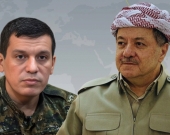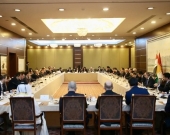Peace envoy heads for Syria, Russia slams rebel threats

Lebanese airport sources said Brahimi flew in to Beirut from Tehran and was to travel overland to Damascus the same day, making his first visit to Syria since last December.
At that time, Brahimi called for "real change" in Syria, and for all powers to be handed over to a transitional government. Official media in Damascus responded by branding him as biased.
This time around, Damascus has said the 79-year-old is welcome so long as he stays "impartial".
In Tehran, Brahimi said it was "necessary" for Iran, a key ally of the Damascus regime, to take part in the Geneva II conference slated for next month and aimed at ending Syria's two-and-a-half-year conflict.
The initiative's backers, Washington and Moscow, have struggled to win the support of the warring parties in Syria, where more than 115,000 people are estimated to have been killed in the 31-month conflict.
In the latest blow, 19 Islamist groups fighting to topple President Bashar al-Assad's regime issued a statement Sunday saying the Geneva 2 conference "is not, nor will it ever be our people's choice or our revolution's demand."
"We consider it just another part of the conspiracy to throw our revolution off track and to abort it," said the statement read out by Suqur al-Sham brigade chief Ahmad Eissa al-Sheikh in a video posted online.
They went on to say that anyone who attends such talks would be committing "treason" and "would have to answer for it before our courts."
Russia on Monday issued a stinging rebuke to the rebels.
"It is outrageous that some of these extremist, terrorist organisations fighting government forces in Syria are starting to make threats," Foreign Minister Sergei Lavrov said in televised comments.
"The threats are directed at those who have the courage to attend the proposed Geneva conference being offered by Russia and the United States with the entire world's support."
The Geneva conference was proposed jointly by Lavrov and US Secretary of State John Kerry in May but has since been repeatedly delayed.
United Nations chief Ban Ki-moon is still to name a formal date for the proposed meeting despite comments from some Syrian and other Arab officials suggesting that the talks could be held late next month.
Under pressure from its Western backers to attend, the National Coalition opposition group is to meet on November 9 to decide whether to take part in the peace conference.
But it has insisted it will only do so if there are guarantees Assad will step down, and its leader Ahmad Jarba has also said no talks can take place unless the regime frees women and children from its jails.
Assad has said "the factors are not yet in place" for such talks, and has repeatedly rejected negotiations with any group tied to the rebels or to foreign states.
On the battlefront, Syria's army regained control of the Christian town of Sadad in the central province of Homs after days of fighting against rebels and jihadists, Syria's state news agency SANA reported Monday.
"Our valiant forces have re-established security and stability in Sadad," SANA said.
The Syrian Observatory for Human Rights confirmed the report, adding that anti-government forces had withdrawn to Mahin, scene of fierce fighting for the past week for control of a large, highly strategic arsenal.
The Observatory had at the weekend reported "at least 100 killed from among the ranks of the army and dozens more among the rebels and jihadists" in the fighting.
AFP












